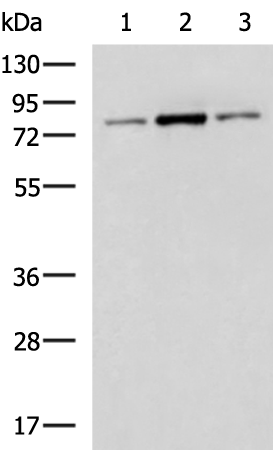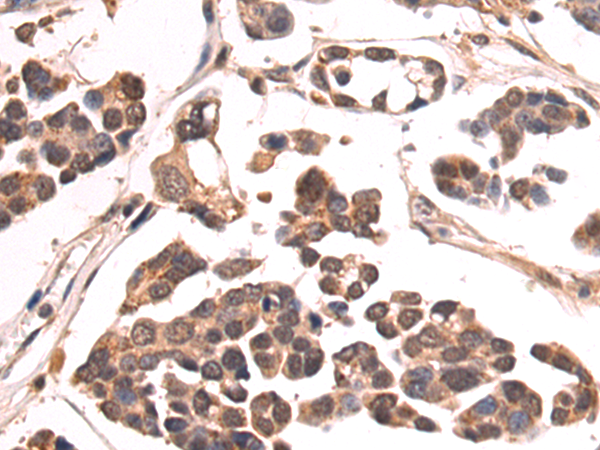

| WB | 咨询技术 | Human,Mouse,Rat |
| IF | 咨询技术 | Human,Mouse,Rat |
| IHC | 1/50-1/200 | Human,Mouse,Rat |
| ICC | 技术咨询 | Human,Mouse,Rat |
| FCM | 咨询技术 | Human,Mouse,Rat |
| Elisa | 1/5000-1/10000 | Human,Mouse,Rat |
| Aliases | UCHL2; hucep-6; HUCEP-13 |
| WB Predicted band size | 80 kDa |
| Host/Isotype | Rabbit IgG |
| Antibody Type | Primary antibody |
| Storage | Store at 4°C short term. Aliquot and store at -20°C long term. Avoid freeze/thaw cycles. |
| Species Reactivity | Human, Mouse, Rat |
| Immunogen | Fusion protein of human BAP1 |
| Formulation | Purified antibody in PBS with 0.05% sodium azide and 50% glycerol. |
+ +
以下是关于BAP1抗体的3篇参考文献的简要概述:
---
1. **文献名称**: *Germline BAP1 mutations predispose to malignant mesothelioma*
**作者**: Testa JR, et al.
**摘要**: 该研究首次揭示了BAP1种系突变与恶性间皮瘤易感性的关联。通过免疫组化(使用BAP1抗体)和基因测序,发现BAP1蛋白表达缺失可作为恶性肿瘤(如间皮瘤和葡萄膜黑色素瘤)的分子标志物,并提示其作为肿瘤抑制基因的功能。
---
2. **文献名称**: *Loss of BAP1 expression is associated with immunosuppressive tumor microenvironment and poor prognosis in clear cell renal cell carcinoma*
**作者**: Joseph RW, et al.
**摘要**: 研究利用BAP1抗体进行免疫组化分析,发现肾透明细胞癌中BAP1表达缺失与肿瘤微环境免疫抑制特征相关,且患者总生存期较短,提示BAP1可作为预后评估的生物标志物。
---
3. **文献名称**: *BAP1 immunohistochemistry predicts outcomes in a multi-institutional cohort with clear cell renal cell carcinoma*
**作者**: Hakimi AA, et al.
**摘要**: 通过多中心队列研究,验证了BAP1抗体在肾透明细胞癌中的临床应用价值。结果显示BAP1表达缺失与更高的肿瘤侵袭性和更差的临床结局显著相关,支持其作为预后指标的应用。
---
**备注**:以上文献均聚焦于BAP1抗体在癌症诊断及预后中的实用性,涵盖间皮瘤、肾癌等类型。如需具体文献来源(期刊、卷号等),可进一步补充。
The BAP1 (BRCA1-associated protein 1) antibody is a critical tool in cancer research and diagnostics, targeting the BAP1 protein encoded by the *BAP1* gene on chromosome 3p21.1. BAP1 functions as a tumor suppressor, participating in chromatin remodeling, DNA damage repair, and cell cycle regulation through its deubiquitinase activity. Mutations or loss of BAP1 are strongly linked to cancer susceptibility and aggressiveness, notably in mesothelioma, uveal melanoma, renal cell carcinoma, and certain melanocytic tumors.
BAP1 immunohistochemistry (IHC) using specific antibodies helps identify BAP1 protein loss, aiding in differential diagnosis. For instance, BAP1-negative staining in mesothelial proliferations supports malignant mesothelioma over benign reactive conditions. Similarly, it distinguishes atypical Spitz tumors from malignant melanomas. The antibody's clinical utility extends to prognostic stratification, as BAP1 loss in uveal melanoma correlates with higher metastatic risk.
Research applications include studying BAP1's role in epigenetic regulation and its interaction with pathways like the BRCA1/BARD1 complex. However, interpretation requires caution, as staining patterns vary by tumor type and antibody clones. Validated BAP1 antibodies remain essential for advancing molecular oncology and personalized therapeutic strategies.
×